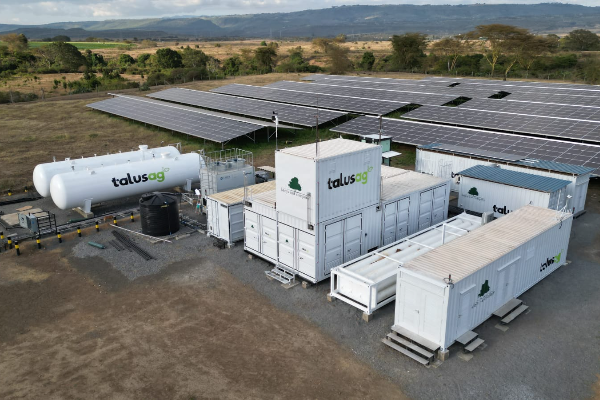Under normal circumstances, one could hope for increased imports to offset lower domestic production of food crops. Unfortunately, the current global crisis, particularly affecting sub-Saharan Africa (SSA), has led to a steady rise in food prices.
Furthermore, the cost of fertiliser which is a key component in boosting crop production in the region is one of the highest as compared to other parts of the world which have better crop:fertiliser price ratios.
In fact, fertilizer prices started increasing drastically in the global markets in the second quarter of 2021 owing to various factors especially the increase in natural gas prices and freight rates, according to International Fertilizer Development Centre (IFDC).
With a close focus on SSA, the latest World Bank estimates indicate that fertiliser prices have tripled since early 2020 and remain volatile, putting a stable supply of fertilizer out of reach of many small farmers.
In the wake of this grim future, Talus Renewables, a US-based energy technology company is strategically positioning its operations in the region and working toward a moment when it is able to offer hope to around 33 million stallholder farms, represent 80% of all farms in the region, and which contribute up to 90% of food production in some sub-Saharan African countries.
Through strategic partnerships, the company continues to establish their footprint in the region with an aim to provide low-cost, carbon-free nitrogen fertilizers through their distributed network of on-site, green ammonia systems.
According to Hiro Iwanaga, the CEO and Co-Founder of Talus Renewables, smallholder farmers in the SSA region have been experiencing myriad of challenges negatively affecting their farms’ output hence the need to come up with sustainable approaches to help boost their yields and livelihoods.
“Besides climate change which is a serious problem to the agricultural sector globally and especially to the African farmer, accessing safe and affordable fertiliser in time for production has also been another impediment as the bulk of the product is shipped from outside the continent,” said Hiro.
“This long chain of logistics has seen the growers spend more after waiting for long to have fertiliser reach them and now, coupled with Ukraine war, there is a significant disruption in global supply chains for fertilisers among other commodities particularly for African countries which receives their major fertiliser supplies from Russia and Ukraine.”
However, with Talus’ groundbreaking renewable technology, ammonia- a critical raw material used in manufacturing nitrogen-based fertilizers, can now be produced locally at lower-cost and carbon-free at or near the point of use, creating value for agriculture.
This technology eliminates the traditional process of ammonia production that relies on extracting hydrogen from natural gas, an approach laden with carbon emissions.
In fact, averagely every metric ton of ‘grey’ or natural ammonia released into the atmosphere contributes to 1.9 to 2.6 metric tons of greenhouse gases but the firm’s method offsets this carbon-intensive process by harnessing electricity from an in-house solar farm to convert hydrogen, driven from water into fertilizer.
Last year, Talus partnered with Kenya Nut Company to deploy its modular, containerized ammonia and fertiliser production facility in the East Africa nation.
According to Graeme Rust, Kenya Nut Company CEO the 15-year offtake agreement is a vital step towards greener and more sustainable agriculture practices for the company and the many smallholder farmers that the on-site hydrogen-to-fertilizer plant seeks to serve going into the future.
“We are now looking into commercializing the production moving step by step carefully to ensure the process is safe and the delivery of the product up to standard,” said Graeme.
“I believe this approach will be a real game-changer for the many famers in the SSA who still rely on rain-fed agriculture and thus need reliable fertiliser for their farms.”
Hiro says that the deployment of the technology in Kenya will also cut on costs and carbon emissions produced during thousands of kilometres journeys farmers make to secure a bag of fertiliser.
“Shifting to locally produced ammonia not only reduces the carbon footprint of the ammonia industry but also optimizes operations and cuts costs for farmers. This is especially beneficial for small-scale subsistence farmers in the Global South, who frequently face the burden of expensive supply chain disruptions,” he said.
In this, the company aims at helping the growers increase crop production by 50-100% and reduce water use on their farms by 30% further ensuring food and nutrition security for the many households.
According to Hiro, the partnership with Kenya Nut Company is just one of the many expansion strategies Talus is venturing into to eliminate expensive and unreliable transport systems that many farmers in SSA have faced before.
“Our key focus is the agriculture sector, the main source of livelihoods of many households in Africa. In this, we continue to extend our footprint in a number of countries in the SSA region as part of our ambitious expansion plans targeting several locations across the continent,” said Hiro.
Currently, ammonia industry contributes to around 2% of global CO2 emissions, comparable to the carbon footprint of the commercial aviation sector.








